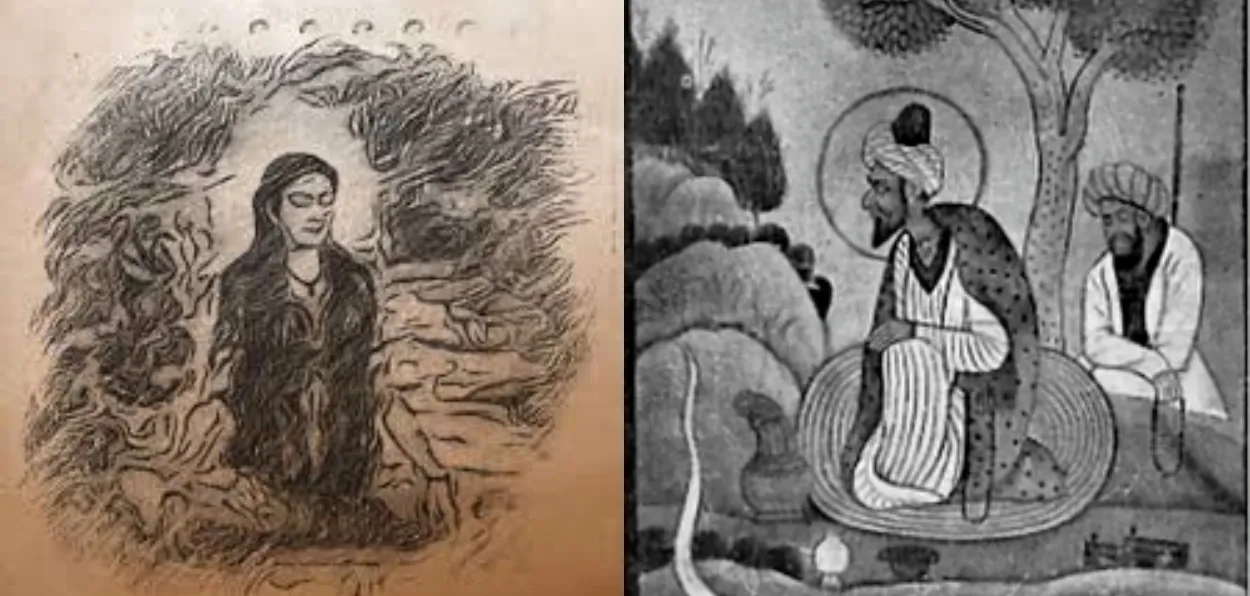
Amir Suhail Wani
The history and cultural fabric of Kashmir have long been intertwined with spiritual practices that are as unique as the region itself. Among the most significant spiritual traditions that have shaped the ethos of Kashmir is Rishism, a mystical movement, and philosophy rooted in the teachings of the Rishis (saints or sages) of the region. The term "Rishism" refers to the spiritual and philosophical practices followed by these holy figures, and it has had a profound influence on the Kashmir Valley's religious, cultural, and social landscape.
The term "Rishi" in the context of Kashmiri mysticism is often used to denote a person who has attained an elevated state of spiritual insight, and who is deeply attuned to the divine essence of the universe. Unlike the ascetics of other regions, the Kashmiri Rishis were not simply contemplative figures but also engaged deeply with the socio-political, philosophical, and artistic dimensions of their surroundings. They played a pivotal role in shaping the syncretic and pluralistic traditions of Kashmir, where Hinduism and Islam, particularly Sufism, coexisted harmoniously.
The Origin
Rishism in Kashmir emerged as a blend of ancient Vedic traditions and later Islamic mysticism, specifically Sufism. The foundational roots of Rishism can be traced to the ancient Kashmir Shaivism. This philosophical school espouses a non-dualistic vision of reality, where the divine (Shiva) and the self (Atman) are considered one. The Rishis of Kashmir were primarily concerned with the experiential realization of this truth, seeking union with the divine through meditation, self-inquiry, and spiritual discipline.
 Chrar-e-Sharif shrine, the resting place of Nund Rishi
Chrar-e-Sharif shrine, the resting place of Nund Rishi
However, the introduction of Islam in the Kashmir Valley around the 14th century provided a unique dimension to Rishism, as the teachings of Sufi mysticism began to influence the indigenous spiritual practices. The Islamic Rishis of Kashmir, also known as "Kashmiri Sufis," harmonized the earlier Hindu mysticism with the Sufi emphasis on divine love, devotion, and inner purification. This synthesis of indigenous spirituality with Sufi mysticism gave rise to a distinctive tradition, often called "Kashmiri Rishism."
At its core, Rishism stresses the idea of direct personal experience with the divine, beyond ritualistic practices or dogmatic beliefs. The Rishis sought a universal truth that transcends sectarian boundaries, focusing on inner peace, wisdom, and compassion. Central to this tradition is the belief in the unity of all existence—human beings, nature, and the divine—along with a commitment to living a life of piety, humility, and service to others.
The Life and Legacy of Rishis
The Kashmiri Rishis were not just solitary figures but were integral to the social fabric of the region. Many of them were known for their profound wisdom, charismatic presence, and ability to address the socio-political issues of their time. They were not merely spiritual leaders but also played roles as social reformers, promoting values of tolerance, inclusivity, and harmony.
Some of the most revered Kashmiri Rishis include:
Sheikh Noor-ud-Din Noorani (Nund Rishi): Often considered the founding figure of Kashmiri Sufism, Sheikh Noor-ud-Din Noorani, also known as Nund Rishi, is one of the most important saints in the tradition of Rishism. He emphasized the oneness of God and lived a simple life of devotion and contemplation. His teachings are a blend of Sufi mysticism and local Kashmiri spirituality, and he is regarded as a bridge between Hinduism and Islam in Kashmir.
Lal Ded (Lalla Arifa): A 14th-century mystic poet and saint, Lal Ded, also known as Lalla Arifa, is one of the most beloved figures in Kashmiri spirituality. A devotee of Shiva, she is considered a precursor to the Rishi tradition, embodying its core principles of transcendence and unity with the divine. Her poetry, written in Kashmiri vernacular, keeps inspiring generations.
Shams-ud-Din Iraqi: A prominent 14th-century Sufi saint, Shams-ud-Din Iraqi was instrumental in spreading Sufism in Kashmir. He integrated Sufi teachings with the indigenous mysticism of the region and became a spiritual guide to many. His influence on Kashmiri Rishism was profound, as he emphasized the inner path of self-purification and direct communion with the divine.
Premier women and child hospital of Kashmir named after Lal Ded in Srinagar
Habba Khatoon: Known as the "Queen of Kashmiri Poets," Habba Khatoon was a 16th-century mystic and poet whose works were deeply influenced by the Rishi tradition. Her poetry, often focusing on themes of divine love and separation, reflects the mystical experiences of the Kashmiri Rishis. Habba Khatoon’s songs, known as "Wuchhun," are still sung today by the people of Kashmir.
These figures exemplify the diversity within Rishism and the integration of multiple spiritual traditions. Whether through poetry, music, or ascetic practice, these Rishis helped shape the spiritual and cultural identity of Kashmir.
Key Tenets of Rishism
While Rishism is not a formalized religion with rigid doctrines, several key themes and teachings are common across the various Rishi figures. These include:
Unity of God: Central to the philosophy of Rishism is the belief in the oneness of God. Whether described through the Hindu notion of Brahman or the Islamic conception of Allah, the Rishis saw the divine as an all-encompassing, immanent force that pervades all of existence.
Rejection of Sectarianism: One of the most significant aspects of Rishism is its rejection of rigid religious boundaries. The Kashmiri Rishis believed that true spirituality transcends sectarian labels, and they emphasized the universality of spiritual experience, whether one follows Hinduism, Islam, or any other tradition.
Compassion and Service: The Rishis were not just concerned with their spiritual advancement but were deeply committed to serving society. They emphasized humility, compassion, and service to others as integral aspects of the spiritual path.
The Role of Poetry and Music: Mystical poetry and music played a crucial role in the spiritual life of the Rishis. Many Rishis expressed their experiences of the divine through poetry and song, creating a rich tradition of mystical literature in the Kashmiri language. These songs often expressed themes of longing, divine love, and the ultimate union with the divine.
 Habba Khatoon peak of Gurez Valley, Kashmir
Habba Khatoon peak of Gurez Valley, Kashmir
Self-Realization: Rishism emphasizes the importance of self-inquiry and meditation in the pursuit of spiritual enlightenment. Through introspection and deep spiritual practice, individuals can realize their true nature as one with the divine.
Rishism's Influence on Culture
The impact of Rishism on Kashmiri culture cannot be overstated. From music and literature to art and architecture, the legacy of the Rishis permeates every facet of Kashmiri life.
Poetry: Kashmiri poetry, particularly in the vernacular, owes much to the influence of the Rishis. The works of saints like Lal Ded and Habba Khatoon are not only expressions of mysticism but also represent a cultural tradition that emphasizes beauty, grace, and the spiritual quest.
Music: The Kashmiri tradition of Sufiana Kalam, a form of Sufi music, has deep roots in the mystical teachings of the Rishis. This music, characterized by soulful melodies and devotional lyrics, is still performed in the region today, especially in Sufi shrines and gatherings.
Architecture: The architectural landscape of Kashmir, particularly the shrines dedicated to the Rishis, reflects the syncretic nature of the region’s religious traditions. These shrines, often built in a combination of Islamic and Hindu architectural styles, stand as symbols of the harmony that the Rishis sought to create in Kashmir.
Social Harmony: The teachings of the Rishis have played a key role in fostering social harmony in the region. Their emphasis on unity, tolerance, and the rejection of sectarianism helped create a culture in which Hindus and Muslims lived together in relative peace for centuries.
In today's world, where sectarian violence and religious intolerance are prevalent in many regions, the teachings of the Kashmiri Rishis remain highly relevant. Their emphasis on unity, compassion, and direct spiritual experience offers a counter-narrative to the divisive ideologies that often dominate religious discourse. Furthermore, in a time of rapid social change and technological advancement, the Rishis' emphasis on introspection, mindfulness, and the cultivation of inner peace offers valuable lessons for individuals seeking meaning in an increasingly chaotic world.
ALSO READ: How Pak terrorist Mast Gul tried to annihilate Sufism in Kashmir and failed
Rishism represents one of the most profound and harmonious expressions of spirituality in the Indian subcontinent. The teachings and legacy of the Kashmiri Rishis, who synthesized elements of Hinduism and Islam into a unique mystical tradition, continue to inspire individuals seeking deeper meaning and connection to the divine. Through their wisdom, poetry, and practices, the Rishis of Kashmir have left an indelible mark on the region's cultural and spiritual heritage, offering timeless lessons in unity, self-realization, and compassionate living.
